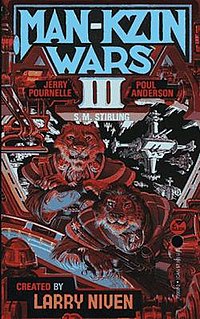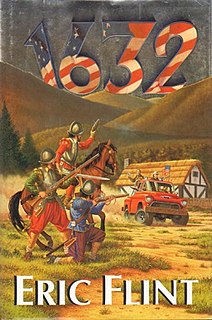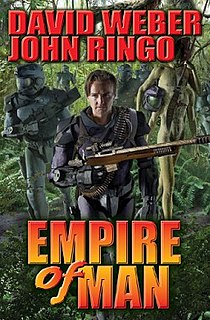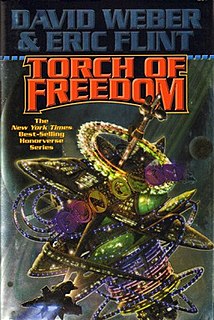
The alien invasion or space invasion is a common feature in science fiction stories and film, in which extraterrestrials invade the Earth either to exterminate and supplant human life, enslave it under an intense state, harvest people for food, steal the planet's resources, or destroy the planet altogether.

Sexual themes are frequently used in science fiction or related genres. Such elements may include depictions of realistic sexual interactions in a science fictional setting, a protagonist with an alternative sexuality, a sexual encounter between a human and a fictional extraterrestrial, or exploration of the varieties of sexual experience that deviate from the conventional.

A humanoid is a non-human entity with human form or characteristics. The earliest recorded use of the term, in 1870, referred to indigenous peoples in areas colonized by Europeans. By the 20th century, the term came to describe fossils which were morphologically similar, but not identical, to those of the human skeleton.

Eric Flint is an American author, editor, and e-publisher. The majority of his main works are alternate history science fiction, but he also writes humorous fantasy adventures. His works have been listed on The New York Times, The Wall Street Journal, The Washington Post, and Locus Magazine best seller lists. He is a co-founder and editor of the Baen Free Library.

The Kzinti are a fictional, warlike and bloodthirsty race of cat-like aliens in Larry Niven's Known Space series.

The Honorverse is a military science fiction book series, its two subseries, two prequel series, and anthologies created by David Weber and published by Baen Books. They are centered on the space navy career of the principal protagonist Honor Harrington. The books have made The New York Times Best Seller list.

1632 is the initial novel in the best-selling alternate history book series, "1632", written by American historian, writer, and editor Eric Flint.

The Empire of Man is a series of science fiction books by David Weber and John Ringo published by Baen Books. It combines elements of space opera and military science fiction.

The 1632 series, also known as the 1632-verse or Ring of Fire series, is an alternate history book series and sub-series created, primarily co-written, and coordinated by American author Eric Flint and published by Baen Books.

James Henry Schmitz was an American science fiction writer born in Hamburg, Germany of American parents.

Telzey Amberdon is a fictional character in a series of science fiction short stories and two short novels by American writer James H. Schmitz, taking place in his "Federation of the Hub" fictional universe, presumably in the mid-4th millennium. She is introduced as a fifteen-year-old genius, a first-year law student, living on the human-settled planet Orado. Through interaction with alien psychic animals on a resort planet, she discovers that she has psychic powers. Upon her return to her home planet, her abilities are recognized by a mechanism at the spaceport reentry gate and she is effectively made an agent of the Psychology Service. A major pattern in the stories is the development of her powers. Eventually she teams up with the redheaded secret agent Trigger Argee. The series ends inconclusively; in the last story, a villain makes a duplicate of her, who gains a separate identity and name.
The Assiti Shards series is a fictional universe invented by American author Eric Flint. It is a shared universe open to authors of many calibre levels, concerning several alternate history worlds, related to a prime timeline. The defining characteristic of the fictional universe is the existence of the "Assiti Shards effect", and the impact that strikes by Assiti Shards have on characters in the stories. The series is rather large and expansive, having started publication in 2000, and as of 2008, consisting of 15 print books, and 21 e-magazine anthologies, in two different published timelines of the same multiverse.
The Looking Glass, or Voyage of the Space Bubble, series is a military novel series created by author John Ringo and centering on the creation of trans-space portals known as "looking glasses" and the effect their discovery and the discovery of things via the portals have on life on Earth and off it. Ringo wrote the first book in the series alone, and has collaborated with physicist and author Travis S. Taylor beginning with the second book in the series. Books in the series are phrases taken from the poem Jabberwocky.
Ancient astronauts have been addressed frequently in science fiction and horror fiction. Occurrences in the genres include:

Torch of Freedom is a science fiction novel by American writers David Weber and Eric Flint, published on November 3, 2009. It is the second book in the Crown of Slaves series which runs parallel (timeline-wise) to the main Honor Harrington series. It is the sequel to the 2003 novel Crown of Slaves, also by David Weber and Eric Flint. The book includes a Baen CD Library disk.
This is the complete list of works by military science fiction and space opera author David Weber.
This is complete list of works by American science fiction and historical fiction author Eric Flint.
Ryk E. Spoor is an American science fiction and fantasy author, who also writes research grant proposals for a technology firm. He published his first novel, Digital Knight in 2003, and has gone on to publish over a dozen more novels, often in collaboration with author Eric Flint on their Boundary series. He is nicknamed "seawasp" or "Sea Wasp", an online handle he has been using since 1977 in venues such as Livejournal, Dreamwidth and Usenet.

Aliens: Phalanx is a 2020 sci-fi horror novel by Scott Sigler and the ninth book in third novel series based on the Aliens franchise. The novel is set on Ataegina, a planet of castles and medieval culture where a sect of humanity is engaged in conflict with an army of Xenomorphs. A sequel story also written by Sigler will be included in the 2022 anthology Aliens vs. Predators: Ultimate Prey.












